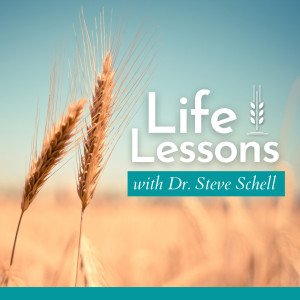
Life Lessons with Dr. Steve Schell
Religion & Spirituality:Christianity

I’ve lived through seasons in which people were absolutely sure that Jesus was coming back any day. It was very exciting and, for some, particularly the young, very disturbing. Any thought of planning for the future went out the window because, after all, what was the use? The end of history, as we knew it, was at hand. It stirred evangelism and put the fear of God in some whose moral life had declined. No one wanted to be caught in a bad situation when Jesus returned.
I’ve also lived through seasons in which believers were not confident that Jesus was going to return soon. We watched the news headlines for signs to determine where we were in God’s prophetic timetable, and it seemed that most of the signs we saw were bad. The world seemed to be headed into its “last days” and we tried to decipher who the antichrist was. So much debate arose over the interpretation of certain passages of Scripture that many people were left feeling unsure of where we were in God’s plan, and that ambiguity seemed to reduce the fear of God in some. Jesus’ coming felt too distant to worry about.
It seems that we vacillate. Sometimes we’re waiting for Him to arrive at any moment, and sometimes we’re watching for prophetic signs and don’t expect Him in our lifetime. And the uncertainty of it all makes us want to ask: Does it really matter? Why don’t we simply leave that topic to the Bible scholars and trust that Jesus will come when He wants to? But it does matter. As we’ll see today the Lord wants us to live with an attitude of expectation as well as an attitude of endurance. You and I need the hope of Jesus’ soon return burning in our hearts. We need to feel the shortness of time. We need to be driven by an urgency that we must do what we can to serve Him while we can. Yet that attitude of high expectation must be tempered with a patient confidence that God is in control of the seasons of human history, and that His prophets have told us this and shown us what to watch for as the end draws near. Too much expectation that His return is immediate and we tend to stop preparing and wait. Too much certainty of where we are on the prophetic timetable and we grow complacent assuming we have lots of time to get it right, and we’ll die of old age before He comes.
The final conversation John records in his gospel is between Jesus and Peter. It contains both an assurance that Peter will live long enough to grow old, and a suggestion that Jesus might return during John’s lifetime. Peter is commanded to pastor Jesus’ followers and then told that when he is old he will be martyred. Yet when Peter asks what will happen to John, Jesus replies that John might not die before He returns to set up His kingdom. Both of the attitudes that we’ve just discussed were present in that conversation. Peter is given a prophetic word that Jesus won’t return during his lifetime, but then Jesus implies that He might return during John’s lifetime. And I don’t think that’s an accident. I think Jesus intended to teach both attitudes. He wanted Peter to prepare himself for a lifetime of faithfulness, and He also wanted him to live as if Jesus was coming very soon.
There are two ways of living out our faith: one is to prepare ourselves spiritually, so we can be faithful for a lifetime, and the other is to wait expectantly for Jesus’ soon return. Those two attitudes seem at odds with one another. You would think that a person would have to choose between them, but in that final conversation by the lake Jesus deliberately left the disciples with both attitudes. He wanted them to keep waiting and watching. He was preparing their hearts to expect and endure, because He might come at midnight and He might delay until a future generation. What we learn today from that dialogue between Jesus and Peter is that we are not to do one and ignore the other. We’re to do both, until we see Him face to face.
More Episodes
 2024-08-29
2024-08-29
 237
237
 2024-08-26
2024-08-26
 197
197
 2024-08-22
2024-08-22
 184
184
 2024-08-19
2024-08-19
 186
186
 2024-08-15
2024-08-15
 194
194
 2024-08-12
2024-08-12
 198
198
 2024-08-08
2024-08-08
 188
188
 2024-08-05
2024-08-05
 220
220
 2024-08-01
2024-08-01
 195
195
 2024-07-29
2024-07-29
 213
213
 2024-07-25
2024-07-25
 209
209
 2024-07-22
2024-07-22
 449
449
 2024-07-18
2024-07-18
 463
463
 2024-07-15
2024-07-15
 461
461
 2024-07-11
2024-07-11
 465
465
 2024-07-08
2024-07-08
 558
558
 2024-07-04
2024-07-04
 550
550
 2024-07-01
2024-07-01
 621
621
 2024-06-27
2024-06-27
 208
208
 2024-06-24
2024-06-24
 178
178
Create your
podcast in
minutes
- Full-featured podcast site
- Unlimited storage and bandwidth
- Comprehensive podcast stats
- Distribute to Apple Podcasts, Spotify, and more
- Make money with your podcast
It is Free
- Privacy Policy
- Cookie Policy
- Terms of Use
- Consent Preferences
- Copyright © 2015-2024 Podbean.com





